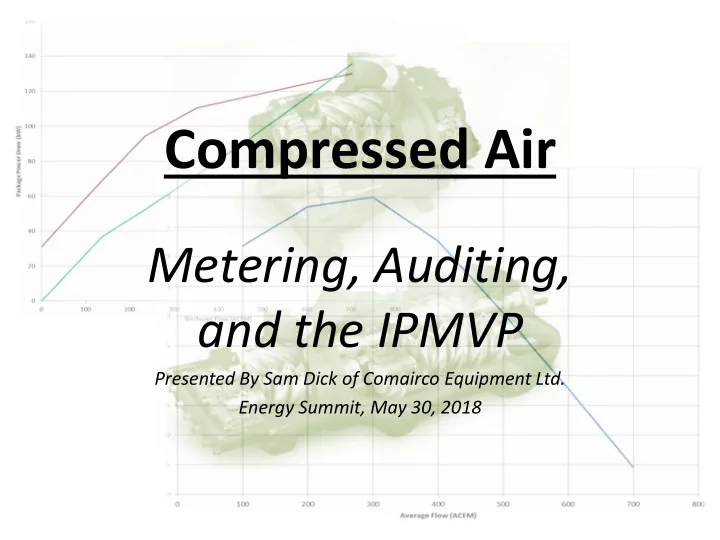

Compressed Air Metering, Auditing, and the IPMVP Presented By Sam Dick of Comairco Equipment Ltd. Energy Summit, May 30, 2018
Presenter • Sam Dick, CMVP • B.Eng. Mechatronics from McMaster University • Lead Auditor for Ontario at Comairco Equipment • Applicant representative for client rebates – saveONenergy, Industrial Accelerator 2
Compressed Air Energy Intensive Often Misused Big Savings Opportunities 3
Let’s get some savings! We’ll replace our old inlet modulation compressor with a new variable speed compressor What could go wrong? 4
What Will Our Savings Be? Baseline Avg. Predicted Savings ~40 kW Reporting Avg. 5
But what if our flow changes? 6
What Will Our Savings Be? Baseline Avg. Predicted Savings ~40 kW Reporting Avg. 7
What Will Our Savings Be? Baseline Avg. Reporting Avg. Flow Increase 8
Adjusted Baseline Actual Savings ~20kW Reporting Avg. What Happened to Our Savings?! 9
What Happened to Our Savings?! After adjustments our savings were cut in half • Why? – Savings will depend on FLOW (CFM) – The power-flow relationship is NONLINEAR – Flow can be very DYNAMIC 10
Savings Depends on Flow Predicted Savings ~ 40 kW Adjusted Savings ~ 20 kW 11
Measurement and Verification International Performance Measurement and Verification Protocol (IPMVP) “...to help ensure the accurate assessment of investment in energy efficiency” Savings = [Baseline Period Energy – Reporting Period Energy] +/- Adjustments 12
Measurement and Verification • IPMVP provides 4 options for M&V process – Options C and D not ideal for compressed air • Option A – Key parameter(s) – More assumptions, less measuring – Justify your assumptions! • Option B – All Parameters – Measure power, pressure, flow, production – Anything else? 13
Measurement and Verification • Option A Example: Leak Reduction – Measure compressor kW before and after leak repairs – Assume that pressure, production, and operating hours have not changed – Justify your assumptions! 14
Measurement and Verification • Option B Example: Leak Reduction – Measure all key parameters before and after leak repairs • Compressor kW, discharge pressure, discharge flow, production volume, operating hours – Assume that other factors are negligible – Justify your assumptions! 15
Measurement and Verification • Why am I measuring.... – Pressure (psig, kPag, barg)? • Changes in operating pressure will change the power- flow relationship – Production (units/day, tons/week, etc.)? • Variations in production create variations in flow – Flow (CFM, m3/h)? • Flow is dynamic, savings will depend on flow 16
FLOW, FLOW, FLOW • Why measure flow? – To better understand your air usage – To verify a change in air usage – To size the optimal equipment – To predict energy savings 17
FLOW, FLOW, FLOW • Can we calculate flow? – Yes, but be careful! – Requires kW and pressure data – Requires performance data – Requires production data – Accuracy is at best +/- 10% 18
Flow Meters • Differential Pressure Flow Meter – Orifice plate, pitot tube, annubar – Measures differential pressure and calculates flow – High cost, high range, poor accuracy at low level – Often requires pressure or temperature compensation 19
Flow Meters • Thermal Mass Flow Meter – Ring style, probe style – Measures thermal dispersion and calculates flow – Lower cost, limited range, better accuracy at low levels 20
Flow Meters • Ultrasonic – Clamps on to outside of pipe – Completely non-intrusive – High cost, good range, maximum flexibility 21
Flow Meters • The meters discussed above are designed for measuring laminar flow only • Turbulent flow cannot be measured accurately 22
3” Flow Meter Comparison 23
3” Flow Meter Comparison Watch out for low level accuracy!! 24
3” Flow Meter Comparison ULTRASONIC 25
What could go wrong? Savings will depend on FLOW (CFM) The power-flow relationship is NONLINEAR Flow can be very DYNAMIC Follow M&V best practices (IPMVP) 26
Contact • Sam Dick, CMVP • Comairco Equipment, Toronto • sdick@comairco.ca • 416-667-9510 27
Recommend
More recommend